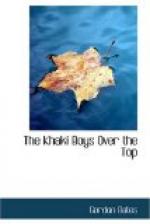He spoke the truth. The boys were enveloped, part of the time, in a haze of smoke and a swirl of burning brands. Tired, and physically and mentally exhausted as they were, they scrambled to their feet—for they had all stretched out on the grass—and made their way to a spot where they could breathe with freedom. The mill ruins were now burning fiercely.
“Any more left in there!” asked the officer, pointing with his axe towards the fiery structure.
“None alive,” answered Jimmy, as he thought of their brave comrades in arms who had perished in wiping out the German machine-gun nest. It was, perhaps, a fitting funeral pyre for them.
“Stay here and I’ll get you some water,” offered the blue-shirted officer. “That will fetch you around quicker than anything else. I can get you a little food, too, I think—emergency rations, if you need them.”
“We aren’t exactly hungry, sir,” said Jimmy, tacking on the “sir” in an almost certain opinion that the man was an officer. “We had some of our own rations, and we were eating when the Huns sent a big shell over that spilled the beans.”
“I see. Well, then, rest here until I can get you some water. Fortunately the Boches can’t blow up a stream. The water is sure to remain somewhere. It won’t take long to get it, I’ll be back in a moment.”
He hurried off between two little hillocks, away from the burning mill and in the direction of the stream.
“Who in the world is he?” asked Bob.
“It’s a puzzle,” said Jimmy. “We’ll ask when we thank him for saving our lives.”
“Here you are, boys,” said the officer, as he came up the slope with a canteen which gurgled most musically with water. “Drink this and then we’ll discuss what’s best to be done.”
“Are we safe here?” asked Jimmy. “Safe from the Germans, I mean? They’re all about here, you know.”
“Yes, I know,” said the officer, and there seemed to be more in his remark than the mere words indicated. “But you’re safe for the time being. They have destroyed the mill, so it is no longer a menace, they fancy. Their guns are directed elsewhere now.”
The sound of distant firing could be plainly heard, but the boys could no longer observe the gray ranks of the Huns on the distant hill. One reason for this was because of the smoke from the burning mill, which swirled about in all directions, and the other reason was that there was a lot of smoke caused by the guns of the Germans, and this, or perhaps a smoke screen which they started, concealed them.
“Feel better?” asked the officer, when the lads had emptied the canteen.
“Much,” answered Jimmy. “And now, sir, may we have the pleasure of knowing to whom we owe our escape? We’re from the 509th Infantry,” he went on. “We were in the battle, and got cut off. Our lieutenant had ordered us to take the mill where some Germans had two machine-guns. We five are all that are left of the sixteen that started. And we wouldn’t be alive but for you. So if we could know whom to thank—”




